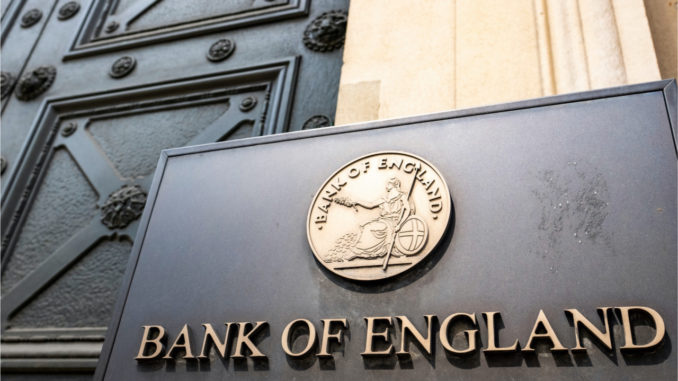
The Bank of England has revealed that it is working on sketching a regulatory framework for crypto assets, according to statements stemming from the central bank’s Financial Policy Committee on Thursday.
BOE Stresses Crypto Assets Need Effective Public Policy Frameworks
On Thursday, the Bank of England (BOE) told the press that it is sketching out a regulatory framework for digital currencies. The BOE statements derive from the central bank’s Financial Policy Committee (FPC) and the bank mentioned sanctions tied to the ongoing Russia-Ukraine war. In recent times, financial regulators and bureaucrats worldwide have been concerned that Russia could bypass economic sanctions via crypto assets.
“While crypto assets are unlikely to provide a feasible way to circumvent sanctions at scale currently, the possibility of such behaviour underscores the importance of ensuring innovation in crypto assets is accompanied by effective public policy frameworks to… maintain broader trust and integrity in the financial system,” the BOE press statement mentioned on Thursday.
BOE Says Crypto Assets Could ‘Present a Number of Financial Stability Risks,’ Central Bank Is Concerned About Stablecoins
Members of the BOE have criticized the cryptocurrency economy for quite some time. In mid-November last year, the governor of the Bank of England, Andrew Bailey, raised concerns about El Salvador making bitcoin legal tender in the South American country. The following month in December, Sir Jon Cunliffe, the BOE’s deputy governor for financial stability, said that crypto asset prices could drop to zero.
The report on Thursday stemming from the FPC mentions financial stability. “The FPC continues to judge that direct risks to the stability of the UK financial system from crypto assets are currently limited, reflecting their limited size and interconnectedness with the wider financial system,” the central bank’s committee noted. The FPC further added:
However, if the pace of growth seen in recent years continues, and as these assets become more interconnected with the wider financial system, crypto assets will present a number of financial stability risks in the future.
Since the start of the Russia-Ukraine conflict, politicians worldwide have been either discussing, proposing, or even implementing legislation to research and regulate digital currencies. Statements from the FPC meeting on Thursday further indicate that the BOE wants crypto assets to fall under the same regulatory umbrella as traditional financial assets.
In addition to sketching a regulatory framework for crypto assets, the FPC mentioned stablecoins, and that a major one without a reliable deposit guarantee could pose a threat to the financial system. “The FPC judges that a systemic stablecoin that is backed by a deposit with a commercial bank would introduce undesirable financial stability risks,” the committee added.
What do you think about the Bank of England prepping to sketch out a regulatory framework for crypto assets? Let us know what you think about this subject in the comments section below.
Image Credits: Shutterstock, Pixabay, Wiki Commons
Disclaimer: This article is for informational purposes only. It is not a direct offer or solicitation of an offer to buy or sell, or a recommendation or endorsement of any products, services, or companies. Bitcoin.com does not provide investment, tax, legal, or accounting advice. Neither the company nor the author is responsible, directly or indirectly, for any damage or loss caused or alleged to be caused by or in connection with the use of or reliance on any content, goods or services mentioned in this article.






Be the first to comment